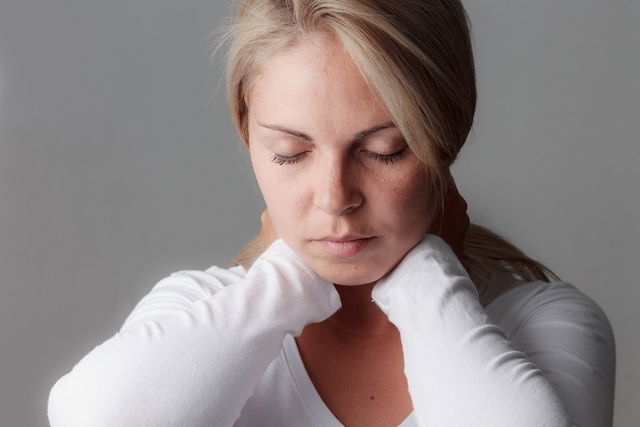Body aches can occur for many reasons. Like stress, anxiety, and infections or inflammation from the flu, dengue or fibromyalgia.
Because body aches can also be a sign of a more serious health condition, and can often be accompanied by other symptoms like fever, headache, coughing or joint stiffness.
If you experience body aches with other symptoms, if the pain is very intense, or if the body aches do not improve within a few days, you should see a family doctor for assessment and treatment.

What causes body aches?
The most common causes of body aches are:
1. Stress and anxiety
Stress and anxiety can lead to excess tension in the body, leading to stiff muscles that cause body aches. Aches related to stress and anxiety can especially be noted in the neck, shoulders and back.
What to do: It is important to adopt relaxation techniques throughout the day to prevent tension and body aches. You should rest and engage in relaxing activities that promote wellbeing, like yoga, meditations, walks or dancing. Read more about teas for anxiety that you can take to soothe nerves naturally.
2. Sleeping in an uncomfortable position
Sleeping in a poor position can cause body aches the next day, as inadequate positioning can overload the joints (especially the spine), leading to pain.
In addition to uncomfortable body positions, poor sleep quality can also cause body aches. Sleep is important for the recovery of tired joints, and poor sleep can also affect your energy levels and lead to incorrect body mechanics the next day.
What to do: To prevent body aches, you should pay attention to the position you use to sleep, as this can overload the joints for many hours. A comfortable position will also promote better sleep quality.
3. Cold or flu
A cold or flu are frequent causes of body aches, which are normally accompanied by a sensation of heaviness in the body, general malaise, a runny nose, headache and fever.
Although these infectious are more common in the winter, they can also occur in the summer. Body aches may be more intense, as dehydration from hot environments can increase pain perceptions.
What to do: In these cases, it is important to rest, drink at least 1.5 L of water per day, and to maintain a healthy, balanced diet. In some cases, the doctor may prescribe medications like acetaminophen and ibuprofen to help relieve symptoms. Learn about other home remedies for the cold and flu that can help to speed up recovery.
4. Physical activity
Exercising can also lead to body aches, which can be more common in people who are more sedentary and do not exercise often. Body aches can also be felt with new workouts or more intense workouts than normal. Heavy physical activity can trigger inflammatory processes in the body, as well as the production of enzymes and substances in the body that cause mild to moderate pain.
What to do: When body aches occur with exercise, it is important to rest, then continue exercising, so that the muscles can become more conditioned. This will prevent body aches in the future. Very intense body aches that prevent you from executing your activities of daily living may be treated with anti-inflammatories, taken as prescribed by a doctor or pharmacist.
5. Arthritis
Arthritis is characterized by joint inflammation that causes pain, stiffness and difficulty moving. It can occur in people of all ages, but is most common in adults over 40 years old.
What to do: Treatment for arthritis should be guided by a rheumatologist, and usually involves the use of medications to reduce swelling and other symptoms. Physiotherapy may also be prescribed, while more severe cases may require surgery. Check out the arthritis diet, which consists of eating anti-inflammatory foods.
6. Fibromyalgia
Fibromyalgia is associated with pain at various points throughout the body. This pain tends to be worse in the morning and mainly affects women.
What to do: You are advised to consult a rheumatologist if you suspect you may have fibromyalgia, as it the doctor will evaluate symptoms and start treatment if a diagnosis is confirmed. Treatment usually involves the use of medications and exercises as directed by a physiotherapist.
7. Dengue, Zika and Chikungunya
Dengue, Zika and Chikungunya are illnesses caused by different viruses that are typically transmitted by bug bites, particularly the Aedes aegypti mosquito. These diseases present with similar symptoms, like body aches and joint pain.
What to do: If you suspect Dengue, Zika or Chikungunya, you should see a doctor for assessment and testing. Treatment typically revolves rest and adequate hydration.
When to see a doctor
If it is important to consult a family doctor, rheumatologist or physiotherapist if your body aches do not improve within 3 days, or if it is accompanied by other symptoms, like:
- Persistent fever
- Intense pain
- Difficulty moving
- Nausea
- Vomiting
- Fainting
- Night sweats
- Weight loss for no apparent reason
- Difficulty breathing
Once symptoms are assessed, the doctor can determine the cause of the body aches and start the most appropriate treatment.






























